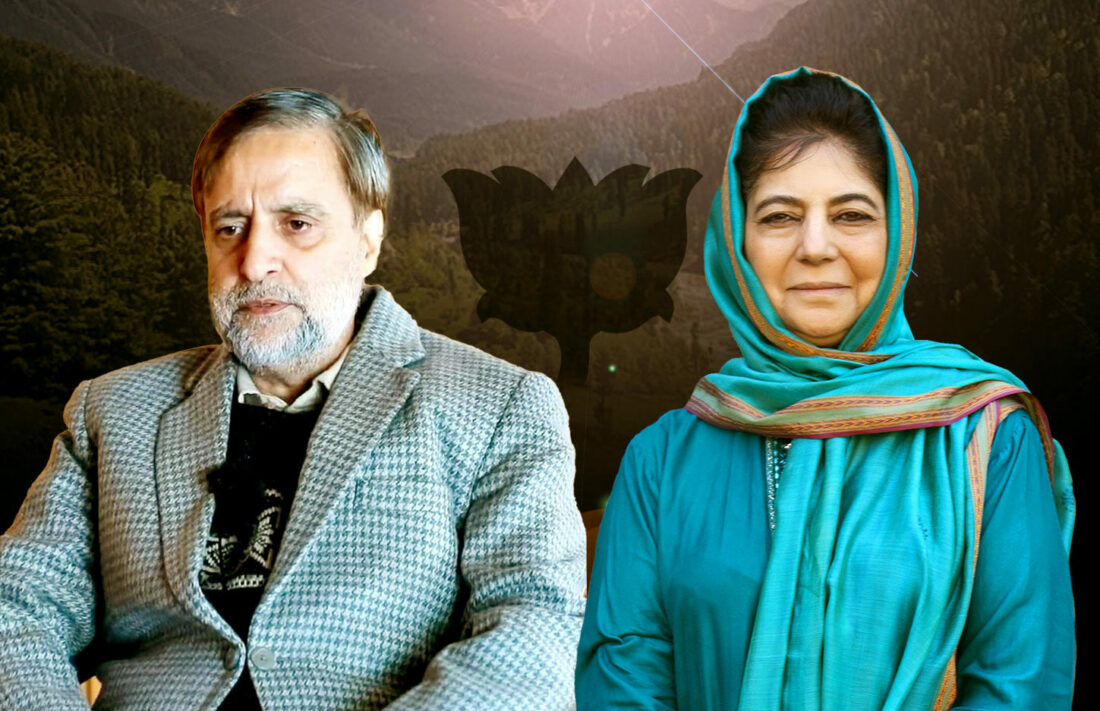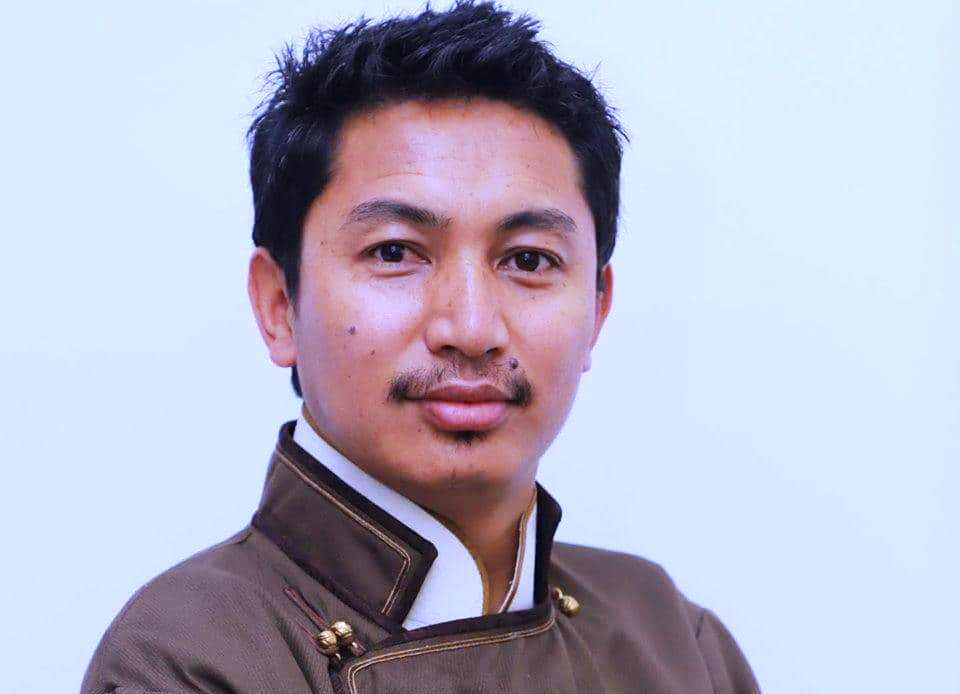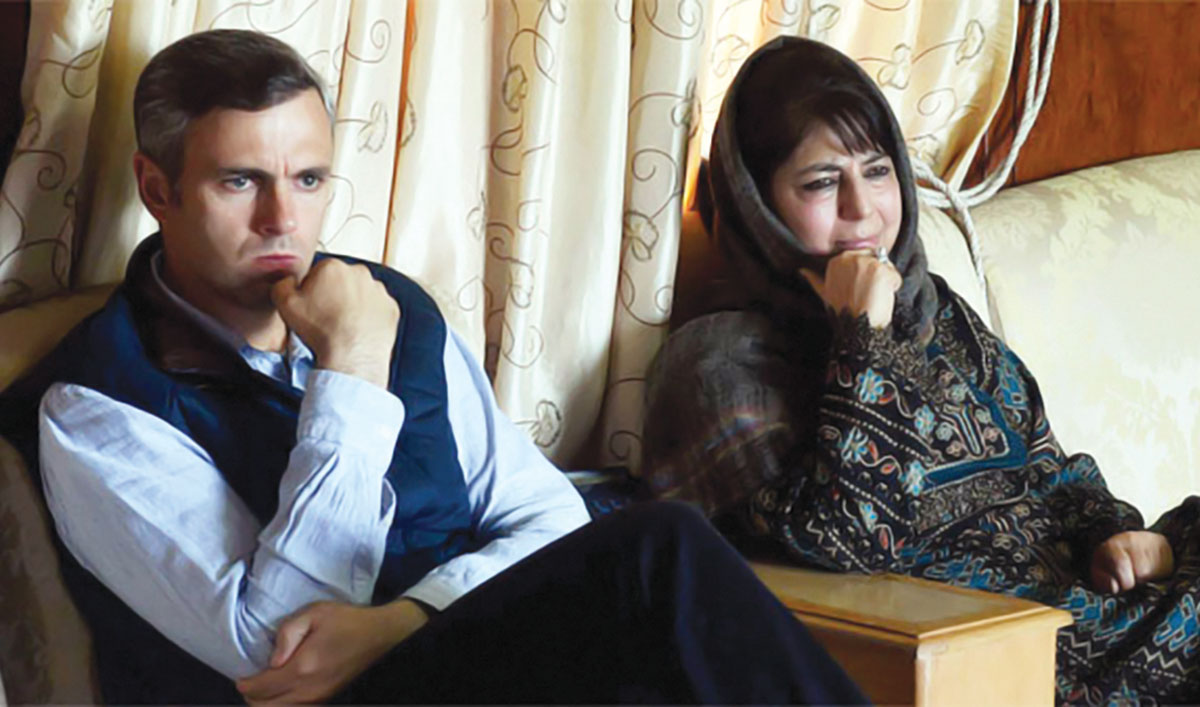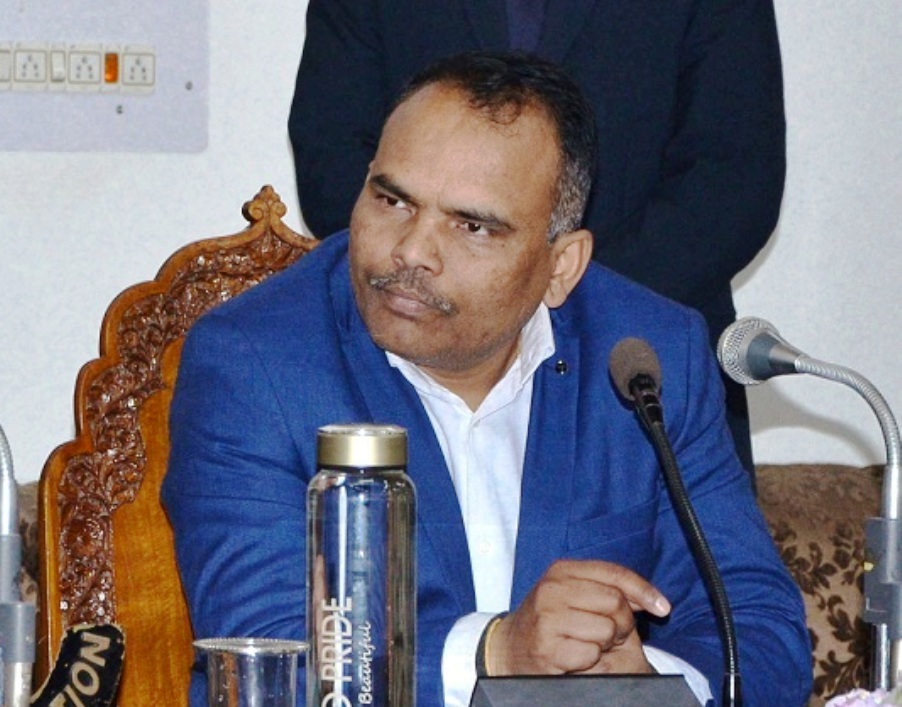Polling was supposed to stamp the Mughal Road to reach the Jhelum Valley through the newly created trans-Pir Panchal constituency. In stage one, the BJP chose not to test uncharted terrain. Midway into polling, the ECI rescheduled the polling. Khalid Bashir Gura gets the ground report on the complex and dynamic politics being played within Jammu and Kashmir

Drawing parallels between marriage and the Lok Sabha elections in the so-called Anantnag constituency, Ghulam Rasool, an octogenarian in Achabal said the “excitement” was devoured by an “invisible” lover. He was referring to the rescheduling of the elections for the constituency in the sixth phase on May 25.
“Here, the contest is between the JKNC and the PDP but the election date was rescheduled on the request of a party that is not in the contest at all,” Rasool said with sarcasm. “We were ready with everything as the situation around conveys but now we have to wait almost 20 days to exercise the right to vote”.
The entire belt, on this side of the Pir Panchal, especially the urban part of it is bedecked like a bride. The flags, and banners of political parties flutter in a spring wind coming from an open field. Election songs blare from the mike-fitted cabs of contesting candidates. Battling weather vagaries and different topographies, the political parties continue campaigning through road shows and rallies. Everything is in place but the ‘wedding’, Rasool refers to, is not happening.
The show, however, goes on. Some people jostle through crowds gathered on the road to get a glimpse of a party leader who emerges out of a car to address people. Some perch on walls, windows, shops. Some reach out to speakers with issues. Some walk past indifferently.
Deferment Dangal
Being unprecedented, the rescheduling of elections in a newly carved out constituency was strongly reacted by the political class. Guftar Ahmad Choudhary, a Gujjar activist, said it was done to favour a specific political party.
“The delimitation was flawed as the two regions of Anantnag and Rajouri-Poonch are separated by culture, climate, agriculture and politics,” Choudhary said. “We don’t have any direct road link for most of the year. It is only faith that connects us.”
Since most of the Gujjar Bakarwal population is into goat-herding, their leaders insist the annual migration has started. They take their herds to the meadows of Kashmir.
“They cannot wait for a month to vote,” one GB leader said. Very few will vote even if logistics are arranged. This will reduce the margins of victory for those who are banking on this electorate.”
“This is unprecedented,” JKNC spokesperson Imran Nabi Dar said. “A huge chunk of the population from Gujjar and Bakarwal communities will migrate. The ECI should have ensured everyone gets a chance to vote. It is a conspiracy by BJP and its overt and covert allies.”
“Carving out this constituency as a geographical audacity was part of pre-poll rigging,” PDP’s Naeem Akhter said. “It was aimed at working along caste and religious faultlines to further disenfranchise Jammu and Kashmir after taking away Art 370 and 35A, the special status and downgrading it as a state.”
Akhter said the BJP created “bonsai parties” in vases to undermine the PDP, but despite that, the tide was turning against them. Now they used these parties to cancel the polls. “BJP has no locus stand as they don’t have any candidate there who is contesting, yet they were front runners advocating for its rescheduling,” Akthar insisted.
The Election Commission of India (ECI) conceded the demands of a group of parties, including the BJP, J&K Peoples Conference (JKPC) who are not in the fray and Jammu and Kashmir Apni Party (JKAP), Democratic Progressive Azad Party (DPAP) to defer elections from third to sixth phase. They highlighted the mobility challenges in campaigning and reaching out to the people especially due to weather and drastically redrawn electoral boundaries.
Challenging Constituency
“The old parties like NC, PDP, Congress have been peddling their narrative in these areas for decades but new entrants should be given time for a level playing field,” Zaffar Iqbal Manhas, the Apni Party candidate, said. “The cost of human lives should be given priority as weather conditions are not favourable on the ground.”
Post delimitation, the constituency is seeing interesting faces. Barring Mehbooba Mufti, who has represented the constituency earlier, there are too many new faces: NC’s tribal leader from Kangan, Mian Altaf and Apni Party’s Pahari leader from Shopian, Zaffar Iqbal Manhas are the prominent ones.
Termed as a “geographic audacity”, the constituency on the two foothills of a mountain range defies geographical, cultural, and linguistic congruity. It has a diverse voter demography, comprising Kashmiri-speaking voters, Gujjars, Bakerwals, and Paharis.
There is only one road connecting the two regions, the Mughal Road, which closes with a drizzle. After campaigning in Shangus (Anantnag), Mehbooba Mufti left to visit the other part of the constituency in Rajouri and had to rush to the airport to reach Jammu first.
The constituency comprises 18 assembly segments from five districts – three from south Kashmir and two from Jammu. It includes assembly segments of Zainapora (Shopian), Damhal Hanji Pora and Kulgam (Kulgam), Devsar, Dooru, Kokernag, Anantnag West, Anantnag, Srigufwara-Bijbehara, Shangus-Anantnag East and Pahalgam (Anantnag); Nowshera, Rajouri, Budhal, Thana Mandi (Rajouri); Surankote, Poonch Haveli and Mendhar (Poonch).
The constituency has 18.30 lakh voters (81189 freshers) and 20 candidates are in the fray including the one who has 20 cases against him, one of them under POSCO. Two are women in the fray besides Baldev Kumar, a resident of Mohali, who is also contesting. While Kashmiris constitute nearly half of the voter base, Paharis and Gujjars – the two competing ST communities – make up significant portions at 28.5 per cent and 21.5 per cent, respectively.
Overall, the constituency has a population of 2620539 – of which 1624,491 are in Kashmir and 515180 (2011 census) in Jammu. Six of the segments including one in Kashmir (Kokernag) are reserved for STs.
Unchanged Issues
Even though the elections were rescheduled, the issues are unlikely to change. The entire campaign by JKNC and PDP surrounds the loss of special status. They see it as disempowerment of the erstwhile state and each party stakes claim to reclaim it. Prime Minister Narendra Modi, on the contrary, has made it his campaign issue and has dared Congress to restore Article 370, if it can. Congress, by the way, has never claimed that it will undo the August 5, 2019, decision-making.
The constituency with geographical barriers is also facing different issues.
“There are issues like implementation of Forest Rights Act and eviction notices which deprive the people of their ancestral land,” Choudhary said as it lacks accessibility and connectivity through road and railway. “The mighty Pir Panchal splits the Anantnag constituency, pushing Rajouri and Poonch to the other side. This is challenging even for political candidates, however, we are comfortable with new boundaries,” said Parvaz Choudhary, another GB activist.
Pahari Factor
The Poonch and Rajouri districts – referred to as Pir Panchal Valley, have a sizable tribal population. It has Gujjar and Bakerwal, who were already listed as ST. BJP recently extended the ST reservation to the Paharis. This has led Pahari leaders to assure the BJP of their support. It was for this very reason that analysts believed the BJP with Pahari support wanted to open its account in Kashmir. However, the party decided against the contest and decided to help the friendly parties.
GB community was against the extension of ST to Paharis. They are polling against the party and many believe that is the reason why the elections were rescheduled. “The pressing concern is growing political disempowerment, Gujjar and Bakkerwal hostel allocation, distribution of resources and funds,” Parvaz said.
The Other Side
Faizan Khanday, 22, a resident of Anantnag, will vote for the first time. A college student, he acknowledges the difficulties faced in the absence of a local representative.
In the absence of a local representative, there is development for tourists and not residents. “Boycott is not benefitting,” he said.
Abdul, 24, also a first-timer, will vote against the arrogance and bureaucracy. “We have been pushed to the wall. Even though PDP has a strong foothold in the south yet it is battling the perception of helping BJP’s entry in Kashmir by allying with them,” Abdul said. The commoners, he said, are distressed because of unemployment, lack of cold storage, load shedding, implementation of smart metres and highway hiccups for security measures.
Many are casting hopes on post-August 5, 2019 born parties, especially the Apni Party. According to Nasurallah Koka, a businessman, traditional parties like NC, PDP, and Congress have deceived people for decades and served their interests.

“We need change and Apni Party reflects it. Previously I had voted for parties like Congress and PDP,” Koka said. “There are many issues in our constituency of Zainapora, Shopian like lack of crop insurance for small farmers, unemployment, lack of basic amenities like water and health care facilities.”
Maryam, a scholar said unemployment, poor implementation of welfare schemes, corruption, and infrastructure development are pressing issues. However, unemployment is causing a lot of anxiety among the youth as despite higher qualifications they are all struggling to find a secure source of income.
“I will cast my vote for the first time but for an independent candidate with better education qualifications. The candidate is a scholar and comes from a middle-class family. He can articulate our voices in Lok Sabha,” she said.
The voter turnout in Rajouri and Poonch remains historically high, unlike Kashmir. Though subdued, many people said they were eligible but would not vote. “I don’t think the Lok Sabha elections would matter to voters. Maybe, we may see a slightly better turnout in assembly elections,” Atta Munimul Zaid, said in Kulgam.
Abdul Bari Naik, a Kulgam resident, is an activist who was arrested in 2021. The assistant professor, who was dismissed for “anti-national” activities, could not contest an independent candidate as even the High Court binned his plea. Abdul RoufNaik, 27, his brother, who is contesting elections said Bari was incarcerated during the filing of his nominations and released after the last date ended. An LLM from Jamia Millia, Rouf is a professional lawyer and is now pursuing a PhD.
“I was not mentally prepared to contest elections. When Abdul Bari Naik was detained I had to contest. However, I am trying to reach out to people,” Rouf said, insisting the previous government did nothing for the poor. “The youth are highly qualified but lack jobs. Many of them due to familial responsibilities have resorted to menial jobs. Youth is growing disillusioned.”
The issue of riverbed mining is a major issue. “As contracts were bagged by outside mafias, the locals couldn’t compete and reap benefits. As sand, boulders and gravel are used in the construction industry, the sector’s prices skyrocketed,” Dr Bari said. “There are environmental costs also as the reckless mechanised excavation of riverbed minerals destroyed flora and fauna,” the activist said. He alleged the hostels for Gujjar and Bakerwals students are occupied by the bureaucrats. “The government has created mobile schools for the community but have appointed teachers who can’t connect with local lingua,” he said.
Addressing a crowd gathered during her roadshow, Mehbooba Mufti said that people should choose a leader who can speak about the fallout of post-August 5, 2019. “Kashmiris are suffocated. There is a crackdown on dissent. Unemployment is high. There is no electricity but poor people have to pay high electricity fees,” she said. “We have to convey to Delhi that the people of Jammu and Kashmir are not happy with its decision to remove special status. Our identity has been snatched and we have to get it back including our resources, jobs and land,” she said.
According to her, it is not a PDP vs. NC fight but to retain lost dignity.
Politics of Representation
The carving out of this constituency forced parties to field candidates that the electorate could connect with. The pre-delimitation Anantnag was won by NC’s Hasnain Masoodi but the party parachuted Mian Altaf, a spiritually revered tribal leader from Kangan. A respected Gujjar leader, his family has won nine assembly elections and his relations with the areas on the other side of the mountain are good.
Apni Party fielded Pahari leader, Zaffar Iqbal Manhas, erstwhile Vice President of Jammu and Kashmir Academy of Art, Culture and Languages.
Unlike the homogenous part of the constituency in Kashmir, the Rajouri Poonch belt is divided on tribal lines. It is Gujjar and Bakarwal versus the Pahari. The latter got ST status recently unlike the former who had it since 1991. Unlike GBs, the Pahari-speaking population has diversity and it includes non-Muslims as well.
“If we had to vote for party we would vote for PDP but now after NC choose MianAltaf, we will vote for him,” Shahid Ayoub, a resident of Rajouri said, insisting the current politics revolves around personalities and not issues. “He is spiritually revered by our community.”
Another Rajouri resident, who wishes to stay anonymous, said that NC is active on the ground but the Pahari vote may get divided between the PDP and Apni Party. “As BJP is not categorically stating its allies, the voter may vote for less known Manhas or popular Mehbooba. The deferment will also tilt the equation in favour of Paharis,” he said.
Electoral Mathematics
In 2019, NC’s Hasnain Masoodi won the berth as he got 32.17 per cent voter share against his runner-up of Ghulam Ahmed Mir of Congress who got 26.83 per cent. Mehbooba Mufti who represented the berth in 2014, ended on third spot with 24.44 percent. However, this time the electoral equation due to delimitation is different and with the influence of overt and covert allies and alliances, the results are enigmatic.
As part of the INDIA bloc, NC and Congress are fighting together in Kashmir and a larger vote share is expected to fall into their basket. However, a twist in the story comes as PDP, which has South Kashmir as its bastion and enjoyed huge influence in Rajouri-Poonch. had many of its leaders crossing floors in the last five years. Some of them have People’s Conference as most have gone to the Apni party. Recently, the People’s Conference and the Apni party have joined hands and are allies in different constituencies.
Some of the leaders who left PDP and joined the Apni Party include Gujjar leaders like Choudhary Qamar Hussain (Rajouri), Shah Muhammad Tantray (Poonch), Choudhary Zulfikar (Rajouri) and Abdul Rahim Rather, its MLA from Kokernag, Rafi Ahmed Mir from Pahalgham, from Damhal Hanji Pora, Abdul Majeed Padder.
Its leader from Shangus, Peerzada Mansoor Hussain and Nazir Laway former Rajya Sabha members from Kulgam left PDP and joined PC. Surinder Choudhary (Nowshera) deserted PDP for NC.
Prominent Pahari leader, Mushtaq Bukhari of Surankot left NC and joined BJP. Recently, he stirred controversy by urging his community to vote for Mehbooba Mufti. Another Pahari leader and former MLC PDP, Advocate Murtaza Khan also made a similar appeal.
These statements led Omar Abdullah to dub PDP as a C team of BJP. In NC parlance, PC, Apni Party, and DPAP are BJP’s B team.
Of late, the BJP’s Party Pahari Cell spokesperson, Satish Bhargav, was expelled by the party even before ECI took cognisance, when he “warned” Paharis against supporting NC, and PDP in the Anantnag-Rajouri berth, reminding them of 1947.
How these ground realities reflect at the EVMs remains to be seen. Parties, however, insist that delay in polls may see the “mood swings” in the region.















